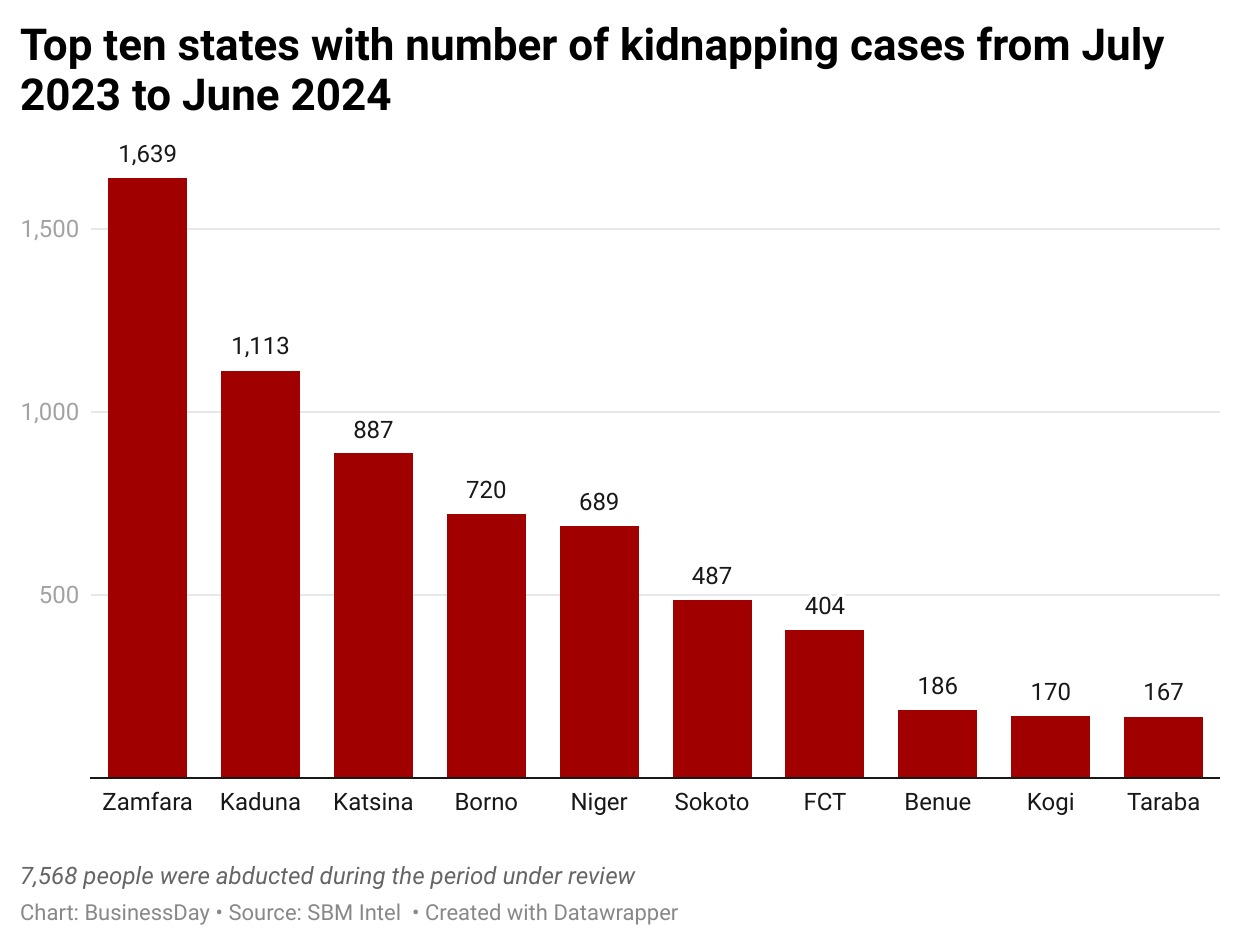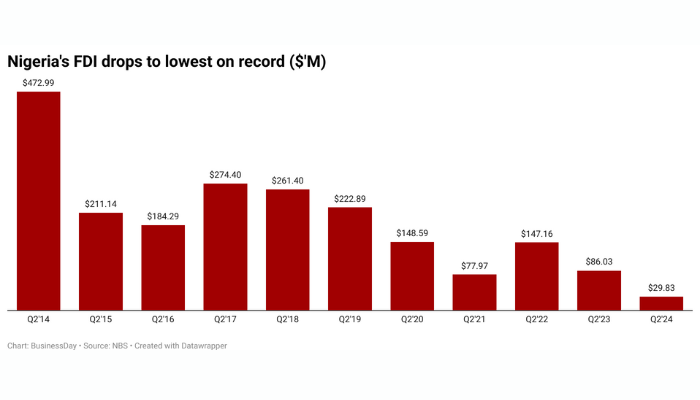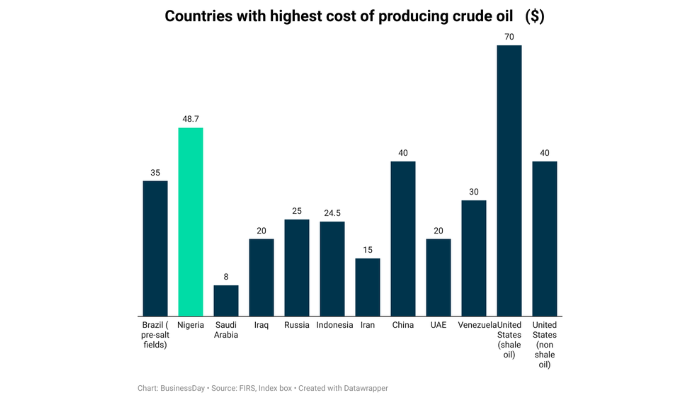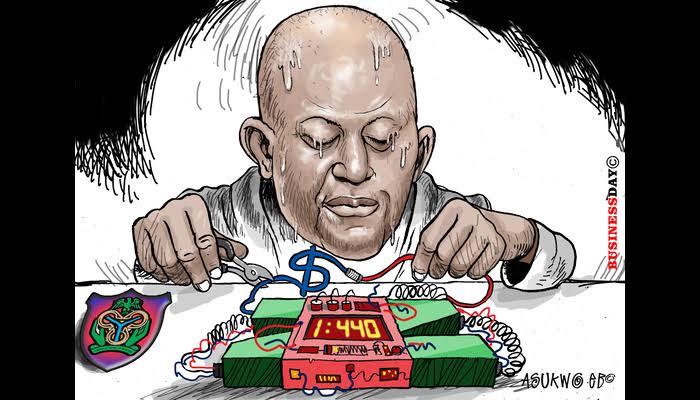-President and private sector research firms differ
President Bola Ahmed Tinubu assured citizens in his Independence Day address on 1 Oct. 24: “On the security front, I am happy to announce to you, my compatriots, that our administration is winning the war on terror and banditry. Our target is to eliminate all the threats of Boko Haram, banditry, kidnapping for ransom, and the scourge of all forms of violent extremism. Within one year, our government has eliminated Boko Haram and bandit commanders faster than ever. As of the last count, over 300 Boko Haram and bandit commanders have been eliminated by our gallant troops in the Northeast, Northwest, and some other parts of the country."
Hail our gallant armed forces, right? Still waiting. The facts are more stubborn than presidential assertions and claims. The statistics are sobering, so dire that informed citizens wonder why officials sought to wrongfoot the head of the federation by making him utter allegations that do not cohere with facts or reality.
Two strong civil society organisations have statistics and narratives that counter the presidential declaration. They are the social research agency SBM Intelligence, the Initiative for Social-Economic Development Communication (INSDEC) in collaboration with the International Organisation for Peacebuilding and Social Justice (PSJ-UK).
SBM Intelligence stated in its report ahead of President Tinubu’s 1 October address. “An analysis of kidnapping incident trends across geopolitical zones from 2022 to 2024 reveals that the total number of incidents in the North for 2024 has surpassed the combined totals of the previous two years, signalling a rapidly worsening and out-of-control situation.
Bandits, insurgents and sundry nihilists abducted no fewer than 7,568 people in 1,130 kidnap attempts around Nigeria in the year from July 2023 to June 2024 and at least N1.048 billion was paid as ransoms in that period.”
Analysts note that the rate of kidnapping in Nigeria currently has been alarming. Key features include
• Mass Abductions: Nigeria has witnessed a surge in mass abductions, particularly in the northern regions. These incidents often involve the kidnapping of large groups of people, including schoolchildren, from educational institutions.
• Ransom Demands: Kidnappers frequently demand ransoms for the release of their victims, which can lead to significant financial burdens for families and communities.
• Criminal Groups: Various criminal groups, including bandits, armed militants, and Boko Haram, have been implicated in kidnapping activities.
• Regional Variations: The prevalence of kidnappings varies across different regions of Nigeria, with some areas experiencing higher rates than others.
SBM Intelligence published a detailed statistical account that pre-empted the claims in the presidential address. The report showed worsening insecurity across the country. They noted in their publication, The Economics of Nigeria’s Kidnap Industry: Follow the Money:
Between July 2022 and June 2023, 3,620 people were abducted in 582 kidnap-related incidents in Nigeria and at least N5 billion ($6,410,256 as of 30 June 2023) were reported as ransom demands, while verified ransom payouts amounted to N302 million ($387,179), or six per cent of what was demanded. However, this figure could be higher due to underreporting.
Kidnap dynamics differ between individual and community cases, with secrecy less prevalent in larger-scale abductions. In some instances, kidnappers opt for non-monetary ransom, like foodstuff. Notably, the Northwest and Northcentral regions exhibit higher in-kind ransom demands. This aligns with Nigeria’s widespread poverty and its correlation with areas where food is commonly demanded.
Additionally, these regions have seen a surge in motorcycle demands due to economic opportunities and possibly because of their potential use in terror activities.
Catholic priests, previously targeted for their ransom value, encountered 21 abductions during this period. Kaduna was the most dangerous state for priests, who were often kidnapped during services. Abductors demanded an average of around N50 million per priest in the past, but the church no longer discloses ransom negotiations to deter further attacks.
The Northcentral region recorded higher ransom amounts, notably in Nasarawa, where targeted abductions yielded maximum ransoms with minimal resistance. The South-South’s low ransom payments may indicate efficient police intervention or victim silence. We believe that the latter is more likely as kidnap victims fear re-abduction.
At the state level, Edo kidnappers sought high ransoms but received little. Conversely, victims in Taraba paid the most, primarily due to a single incident. Zamfara, Kaduna and Niger had the highest per capita abduction rates, often involving mass community abductions. Conversely, Borno reported minimal deaths due to Boko Haram’s targeted and sophisticated tactics.
Across the country, civilians bore the brunt, with 430 fatalities, while security agents and kidnappers themselves accounted for 19 and 121 deaths, respectively.
Pressed to defend her research following the president’s address, SBM Intelligence responded to BusinessDay. “There is hardly any Nigerian who does not know a person kidnapped. One thing about the report we put out is that they are drawn overwhelmingly from media reports. Therefore, if the president’s handlers prefer a more optimistic view of what can be rightly considered a national emergency, we do not share the same prerogative”.
INSDEC and PSJ-UK addressed the press hours after the presidential address on 1 October. They stated that “the cost of insecurity is alarmingly high and shows no sign of abating, underscoring the urgent need for targeted measures from all stakeholders to confront and mitigate its impact.”
Executive Vice President INSDEC Ogie Eboigbe and Chief Executive Officer PSJ-UK Ayo Adedoyin canvassed a “Region-Specific Approach Required to Resolve Insecurity Crisis.”
They submitted that Nigeria’s insecurity is “unresolved” and requires a deeper probe into “the intricate complexities of the crisis based on its root causes.” They called for a problem-specific or region-specific approach beyond the current military approach.
They added, “While the insecurity crisis may be perceived as a general and pervasive issue in the country, its underlying essence, nature, character, and identity differ significantly from one region to the other.
“In Benue State, suspected Fulani herders who destroyed homes, schools, markets, and health facilities displaced residents from rural communities, forcing them into Internally Displaced Persons (IDP) camp, while Imo state continues to record cases of sporadic attacks by ‘unknown gunmen’, (suspected IPOB separatists), kidnappers and occasionally herdsmen which instil fear and disrupting farming, raising food prices.
“The multifaceted nature of insecurity across different regions necessitates tailored strategies that move beyond simplistic explanations and one-size-fits-all solutions,” the report stated.
They contend that the current “militaristic approach is insufficient and counterproductive” and may have “stretched the military’s capabilities, forcing them to engage insurgents of varying types in 30 of Nigeria’s 36 states”.
The report's recommendations included Government acknowledgement and ownership, a comprehensive and integrated approach, advanced technological solutions, strengthening security and governance and community and state policing initiatives.
It also suggested regional and international collaboration, humanitarian and conflict resolution, strategic security policy and legal framework.
Considering the government's significant role in finding lasting solutions to the crisis, the report stated that the government must recognise and address the underlying causes of insecurity, which stem from failures in governance and leadership.
“It should own the problem and actively work towards reclaiming territories overtaken by insurgents. For too long, the government has acted as an outsider, or a standby observer, as if the problem belonged to the communities alone,” it said.






